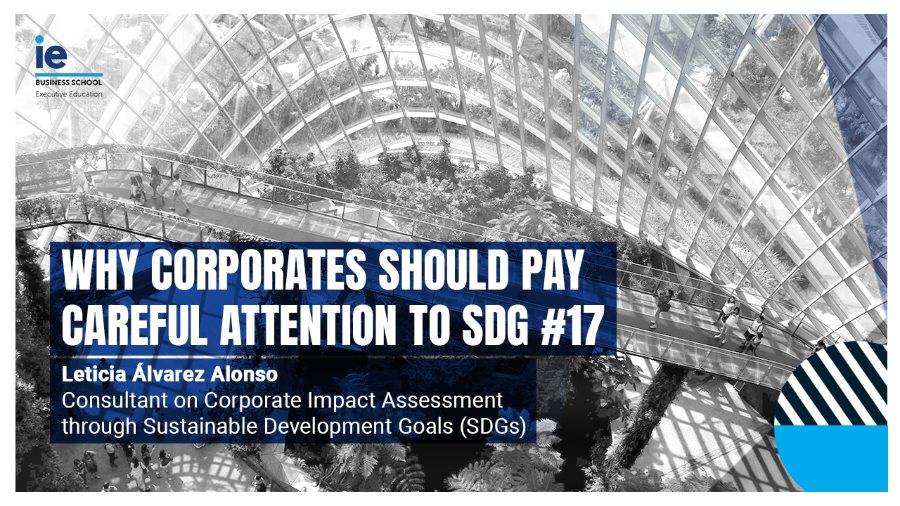Corporate leaders, rise to the challenge | by Concepción Galdón, PhD

Corporate leaders, rise to the challenge: Do the right thing by society and by business
Author: Concepción Galdón PhD., IE Sustainable Impact Teaching and Research Lead/Director of IE’s Center for Social Innovation
There are times in life when your attitudes and decisions reflect who you are with more clarity than the cleanest mirror could. At those times, people around you can see you—the real you. And whatever they see, they won’t forget. This is one such time.
The coronavirus crisis is putting society to the test.
Our individual behavior is being tested, as is that of the organizations and companies where we come together. We are all struggling. Individuals are. Companies are, too. We must all rise to the challenge.
As corporations make decisions to cope with the difficult economic environment, they need to ask themselves what impact these decisions might have going forward. Behaving as a responsible member of society is now, more than ever, not only the right thing to do but also a true competitive advantage that will set some brands apart from the rest for customers and workers alike. Of course, this is easier said than done.
The present public health crisis is generating a socio-economic context that challenges the survival of companies in most sectors.
Many are being hit hard by the change in social behavior brought about by the measures aimed at increasing social distance. Some are directly impacted by the illness itself or by the fear of it. Most, if not all, have revised their revenue generation projections for 2020 to numbers that simply do not add up when compared to costs. Responsible managers are, as I write, looking at their numbers, looking at themselves in the mirror, and trying to make ends meet.
It would be superficial and simplistic to say that all companies should avoid firing anyone or discontinuing services to clients who can’t pay. Even more people will lose their jobs if companies go bankrupt. So, how to assess their decisions?
The truth is that not all companies are made equal. It’s not the same thing to run a young startup or small business as it is to run a big corporation with decades of history. And the main difference between the two is the ability to refinance themselves in the financial markets.
Some companies risk going down. Others risk closing the year with losses that they can overcome with some leverage from banks. The risk-benefit analysis comes out very differently for each of them.
The same corporations who have access to financial markets tend to be those who have made strong statements in the last few years about their purpose and commitment to society. The time for “greenwashing” and boasting of promoting SDGs by simply putting up colored boxes on a website is over.
We’re all about to see who’s who, and it will matter to us and to the corporations.
Numerous studies have confirmed the influence of perceptions about CSR dimensions on companies’ stakeholders’ loyalty, such as customers and employees1. In the case of customers, this impact is partly mediated by corporate image and reputation2. For employees, it’s mediated by perceptions of justice, and organizational identification3.
In summary, if your company is risking losses that it will be able to manage via financial markets, be careful of overreacting by making socially damaging decisions. You might very well be undermining your ability to generate revenue and attract talent in the very near future.
However, decisions you make that prove your purpose and commitment to a fair and sustainable society will grant you extra muscle to overcome a longer-term crisis with the loyalty of your clients and employees.
Not every company has the opportunity to decide between one path and another. If you are a manager in one of the companies who can, your responsibility is even greater.
Stand up to the challenge.
IE Business School recognizes that ESG is much more than a chance to merely look like your organization is doing the right thing. Our four-day program Sustainability: Your Competitive Advantage will give you the tools and mindset to build a sustainable, long-term plan for your brand’s growth.
Add ESG’s opportunities to its obligations —download our brochure to find out more.
References:
1(Ailawadi et al., 2014; Chung et al., 2015; García de los Salmones et al., 2005; He & Li, 2011; Marin et al., 2009; Perez et al., 2012; Srbljinović, 2012)
2(Gürlek, M. et al., 2017, Aramburu, I. A., & Pescador, I. G., 2019)
3(De Roeck, K., et al., 2014)


